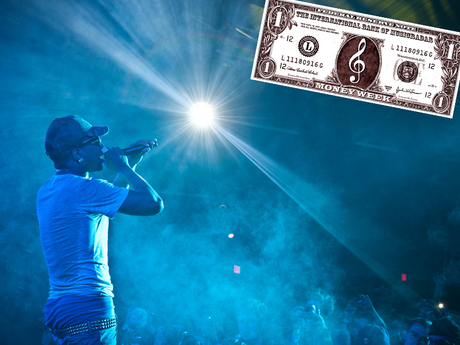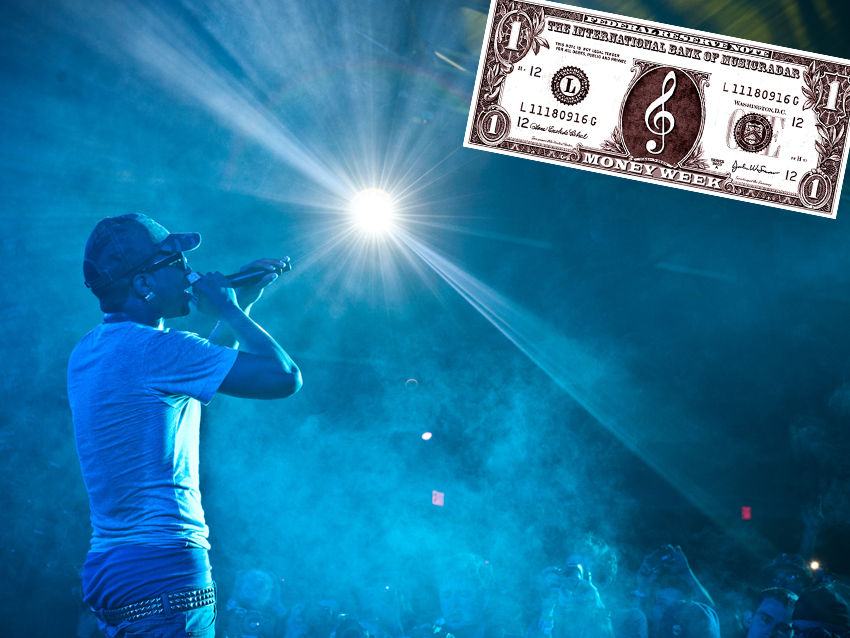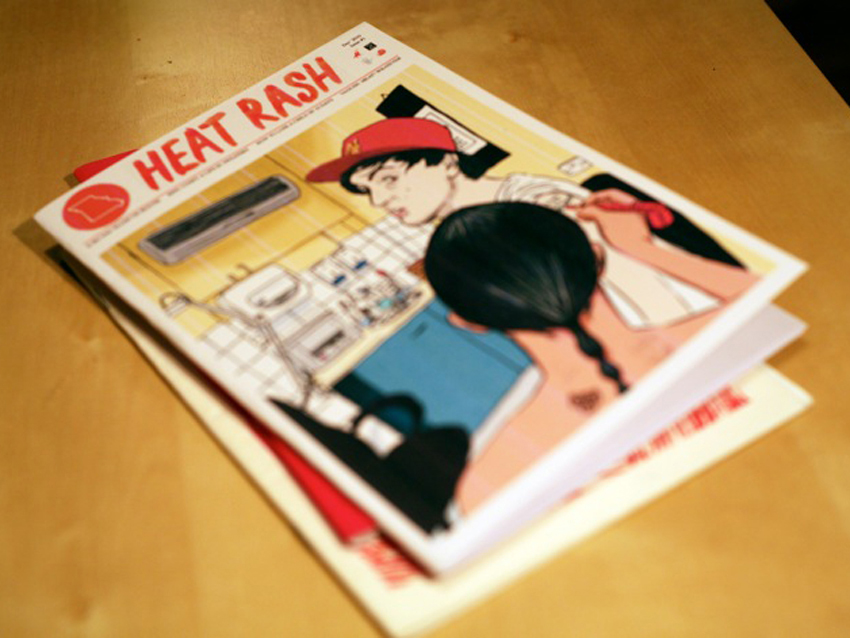

SEO friendly LA rapper Lil B © J. Dennis Thomas/Corbis
We could have easily spent the whole of Money Week on MusicRadar reminiscing about the good old days. Those days when - riding the back of the mid-'90s Britpop wave - a band like Menswear could get a £500,000 publishing deal having written just seven songs. The days when major record labels could afford to pump money into new artists knowing they may risk getting little more than one radio-ready micro-hit and a rehab bill as a return on their investment.
But the sad truth is that those days are long gone. It's a tough world out there for musicians and labels alike; the rise of internet piracy and the much discussed 'death' of the record industry now means that there's just not as much money flying about. Far fewer fledgling bands are getting signed for albums, while many of the bands that do are finding it increasingly tricky to make a viable career out of music.
But, of course, it's not all doom and gloom. Obviously the music industry isn't really dead; it's just a different place now. Sure, you're not going to get sent to a remote island for six months to record your debut album while the label bankroll you, but the rise of the internet brings with it limitless opportunities to get your music out there and, crucially, make a career out of it.
The internet is your friend
Websites like The Pirate Bay and Napster (remember Napster?) may be the music industry's worst enemies, but nasty filesharing sites are vastly outnumbered by the amount of internet start-ups out there that are perfect tools for do-it-yourself musicians.
Sites like SoundCloud, Bandcamp, last.fm, Twitter and Facebook can all be used for free to do things that, less than a decade ago, any musician would have had to pay lots of people big money to achieve - i.e. releasing, distributing and promoting their music.
Radiohead have marked themselves out as champions of the new digital-music business model over the last few years. The 'pay-what-you-like' method the band used to sell their 2007 album In Rainbows online is essentially the same as one of the options open to any artist via distribution site BandCamp, while the announcement, and most of the promotion, for the band's recent King Of limbs was conducted via Twitter.
Want all the hottest music and gear news, reviews, deals, features and more, direct to your inbox? Sign up here.
On an only-slightly smaller scale, alt-folk artist Sufjan Stevens chose to release his most recent album, 2010's The Age Of Adz, and All Delighted People, the EP that preceded it, via Bandcamp. The album was released through Stevens' own independent label Asthmatic Kitty but the label opted to use Bandcamp as its primary distribution tool, using Twitter, Facebook and email mailing lists to promote it.
The EP entered America's Billboard 200 at number 48 after three days of sales exclusively via Bandcamp. In an interview for Bandcamp's blog shortly after the EP's release, John Beeler of Asthmatic Kitty said "we wanted to get the music to the fans as quickly as possible. We wanted them to be able to hear it in one place and then support it right away without having to work to buy the album, which is often the case with promotional streams."
While it's one thing for established artists like Radiohead and Sufjan Stevens to promote themselves through social media tools, trying to do so from a minimal starting point is a whole different ballgame. That's not to say that it's not possible though - if anything it's easier to promote yourself as an artist now than it has ever been.
Last month Wired magazine ran a fairly tongue-in-cheek piece on eccentric up-and-coming LA rapper Lil B's SEO tactics. While it's obviously meant to be taken with a pinch of salt, there's a fairly interesting point to be made about the benefits of building a following by interacting with an online community and making yourself visible on the internet. Turns out there's a genuine benefit to naming your songs after celebrities.
Give it away
In the long run, there's a lot to be said for give your music away for free. The latest crop of under-the-radar but fast-rising hip-hop artists are a prime example of the benefits of online giveaways.
Take controversial, increasingly hyped LA rap collective Odd Future (or Odd Future Wolf Gang Kill Them All to give them their full name). Via their Tumblr site, Odd Future have been giving away albums and mixtapes by their various members for the past three years.
Obviously, a tactic like this means that, until recently, none of the collective had made any money out of record sales - but that's not to say there are no benefits. While media hype and controversial lyrics have contributed to the large cult following the group have amassed over recent months, nothing will grease the wheels of the hype machine like making your music available online, free and just a Google search away.
The result has seen Odd Future play sold-out tours, make live TV appearances and appear on the cover of Rolling Stone and NME. Meanwhile group leader Tyler, The Creator has recently released the group's first 'official' album on stalwart independent label XL, and many of the group's previous releases are scheduled for hard-copy re-releases over the coming months.
Just as notably, one of the group's members, Frank Ocean, has managed to revive a floundering career with the release of his free mixtape nostalgia, ULTRA. Prior to the release Ocean was signed to acclaimed hip-hop label Def Jam, but receiving little attention. But as a result of the word-of-mouth buzz generated by the mixtape Ocean has landed songwriting work on Beyoncé's forthcoming album 4.
It's a tactic that can work for producers too. Sticking with the new wave of hip hop artists, young producer Clams Casino has made a name for himself by offering his beats up to artists for free via email. As a producer he has appeared on releases from the likes of Soulja Boy and the aforementioned Lil B despite having never met either artist or asking for any royalties in return.
Clams Casino recently gave away a free mixtape of his instrumentals, garnering positive press coverage. He now has official releases on various independent record labels scheduled for the coming months - all as a result of emailing out music he made in his mother's attic.
There's more to being a band than selling music
Of course, there's more than one way to sustain a career as a musician. Making money by selling music to your fans is always going to be core to surviving as a band, but there are other ways to engage with, and sustain yourself via your community of fans.
Obviously playing live will always be another important source of revenue, but for smaller bands it can be difficult to make a decent profit out of the touring. Again, merchandise is a long-standing weapon in the professional musician's arsenal, but there's a lot to be said for doing something more creative than offering fans a tshirt with your name on it.
Take, for example, Cardiff-based indie band Los Campesinos! who launched a subscription-based 'fanzine and music bundle' series called Heat Rash towards the end of last year. The idea involves fans paying a £25-per year subscription to receive quarterly bundles including a band produced fanzine, exclusive 7-inch records and MP3s and discounts on the band's other merch and gig tickets.
"It's a great outlet for creativity. Totally separate to any album," guitarist Neil Turner tells us. "It means we can use ideas that wouldn't fit into that mould. People that subscribe hopefully want to hear different, interesting things.

Los Campesinos!'s 'music and zine' bundle Heat Rash © Los Campesinos!
"There are eight of us with a lot of ideas, so this means we can fulfil our musical fantasies and give fans something exciting. The same goes for the zine aspect. It's interesting to read articles written by bands so we indulged ourselves here. It's all done in-house apart from pressing and printing."
Thanks to the spontaneous nature of social networking, things don't have to be so thoughtfully planned, or even particularly related to your music. Back in 2009 former Dresden Dolls vocalist turned solo artist Amanda Palmer notoriously made $19,000 over the course of a few days via her twitter account.
One Friday evening during a night in spent at her computer, Palmer put out a message to her Twitter followers: "i hereby call THE LOSERS OF FRIDAY NIGHT ON THEIR COMPUTERS to ORDER". The resulting responses and retweets led to Palmer trending on twitter and, in conjunction with her followers, designing tshirts live and selling them at $25 each. The result was around $11,000 made via off-hand twitter promotion.
A few days later Palmer used her Twitter account to announce a live webcast auction, in which she spent three hours signing and auctioning off items from around her apartment. Several days later again, Palmer used Twitter to take donations in exchange for tickets for a secret gig which she organised in a recording studio in her native Boston. Commenting in a later blog post, Palmer summed events up thusly: "total made this month using twitter = $19,000. Total made from 30,000 record sales = absolutely nothing".
Going viral
Having a viral hit is pretty much the Holy Grail of promoting yourself in the digital age. It's something that big record companies, PRs and advertising agencies would happily donate a limb to be able to hit on every time.
Take for example New York's Gregory Brothers, who managed to place in the US's Billboard Hot 100 while totally unsigned, with their autotuned comedy tracks based on news reports. Their YouTube videos managed to achieve viral success, leading to enough sales on iTunes to place at number 89 in the chart with little or no financial outlay.
Then again, there's Rebecca Black's Friday. But it would be a lie to say that Black's viral hit came without any financial investment - Black's parents paid $4000 to vanity 'record producers' Ark Music Factory to have their 13-year old daughter's single and accompanying video produced.
Of course, there's the small factor that - in most cases, particularly on YouTube - viral hits need some sort of novelty element to them. The Gregory Brothers' videos have comedy appeal, while Black's hit had the USP of being utterly dreadful. So maybe some kind of knock to your credibility is a pre-requisite to viral success.
Then again, Friday made somewhere over $40,000 and shot Black to worldwide fame (with just a few death threats throw into the bargain - and supposedly Black is yet to see any money). But at least now she's got the free-reign to sit back and write that introspective blues album she'd always dreamed of making… or maybe not.
Rebecca Black aside, what's certain is that, even as a total aside from the live arena there are more ways than ever for musicians to get their music out there. With a bit of creativity and a few SEO skills the world is your oyster.
-------------------------------------------------------------------------------------------------------------------
Liked this? Now read: 10 steps to success in today's musical climate
I'm the Managing Editor of Music Technology at MusicRadar and former Editor-in-Chief of Future Music, Computer Music and Electronic Musician. I've been messing around with music tech in various forms for over two decades. I've also spent the last 10 years forgetting how to play guitar. Find me in the chillout room at raves complaining that it's past my bedtime.